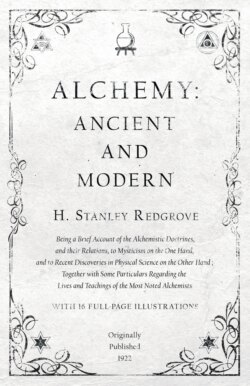Читать книгу Alchemy: Ancient and Modern - Being a Brief Account of the Alchemistic Doctrines, and their Relations, to Mysticism on the One Hand, and to Recent Discoveries in Physical Science on the Other Hand - H. Stanley Redgrove - Страница 12
На сайте Литреса книга снята с продажи.
The Qualifications of the Adept.
Оглавление§ 4. At the same time, it is quite evident that there is a considerable element of Mysticism in the alchemistic doctrines; this has always been recognised; but, as a general rule, those who have approached the subject from the scientific point of view have considered this mystical element as of little or no importance. However, there are certain curious facts which are not satisfactorily explained by a purely physical theory of Alchemy, and, in our opinion, the recognition of the importance of this mystical element and of the true relation which existed between Alchemy and Mysticism is essential for the right understanding of the subject. We may notice, in the first place, that the alchemists always speak of their Art as a Divine Gift, the highest secrets of which are not to be learnt from any books on the subject; and they invariably teach that the right mental attitude with regard to God is the first step necessary for the achievement of the magnum opus. As says one alchemist: “In the first place, let every devout and God-fearing chemist and student of this Art consider that this arcanum should be regarded, not only as a truly great, but as a most holy Art (seeing that it typifies and shadows out the highest heavenly good). Therefore, if any man desire to reach this great and unspeakable Mystery, he must remember that it is obtained not by the might of man, but by the grace of God, and that not our will or desire, but only the mercy of the Most High, can bestow it upon us. For this reason you must first of all cleanse your heart, lift it up to Him alone, and ask of Him this gift in true, earnest, and undoubting prayer. He alone can give and bestow it.”3 And “Basil Valentine”: “First, there should be the invocation of God, flowing from the depth of a pure and sincere heart, and a conscience which should be free from all ambition, hypocrisy, and vice, as also from all cognate faults, such as arrogance, boldness, pride, luxury, worldly vanity, oppression of the poor, and similar iniquities, which should all be rooted up out of the heart—that when a man appears before the Throne of Grace, to regain the health of his body, he may come with a conscience weeded of all tares, and be changed into a pure temple of God cleansed of all that defiles.”4
